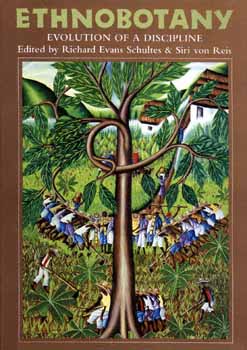
BACK COVER #
Ethnobotany has undergone a true evolution in the 20th century. Although plants have always been important to people, and the study of the knowledge and use of plants must go back to the beginnings of human existence, only in our century has ethnobotany evolved as a distinct branch of the natural sciences. Aristotle's research with plants early on elevated this field to formal study, but it was not until 1895 that the term ethnobotany was coined.Ethnobotany: Evolution of a Discipline is a seminal volume, published on the 100th anniversary of this fascinating science, celebrating its recent evolution and providing a comprehensive summary of the history and current state of the field. It brings a broad and fully interdisciplinary approach to the study of human evaluation and use of plant materials in primitive or unlettered societies. The contributors of the thirty-six articles represent a broad spectrum of academic and scientific skill, as well as an international perspective. The editors are world-renowned ethnobotanists, and the range of carefully selected articles (most of them written specifically for this book) presents a truly global perspective on the theory and practice of today's ethnobotany.
Although rooted in antiquity, ethnobotany is a dynamic contemporary science with tremendous importance for the future. The diminishing rain forests may well hold unknown keys to conquering devastating new diseases, and peoples native to those regions can often lead the way with their herbal knowledge. Experimentation with as-yet-unstudied plants may provide new solutions to expand food and energy reserves for our overpopulated planet.
This volume offers important new material for those who work in fields of science devoted to plants, people, or both -- including anthropology, archaeology, botany, environmental conservation, ethnopharmacology, geography, history, medicine, psychology, religion, and sociology. It is fascinating information for the general lay reader as well. Considering the impact of plant use throughout history in the human social structures of economics, politics, religion, and science, this is a book that contributes immeasurably to our understanding of human history and the world today.

